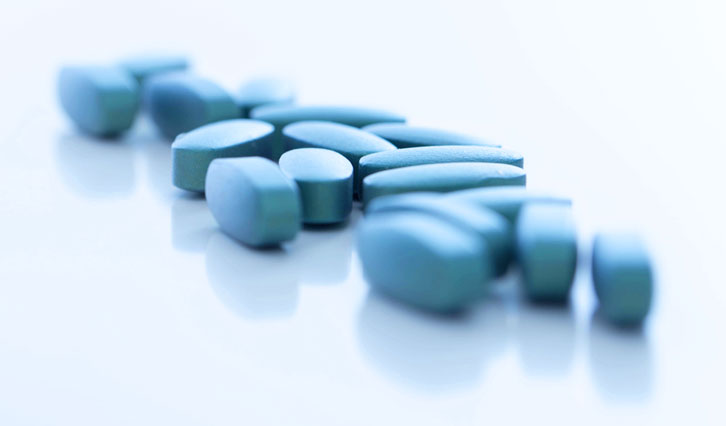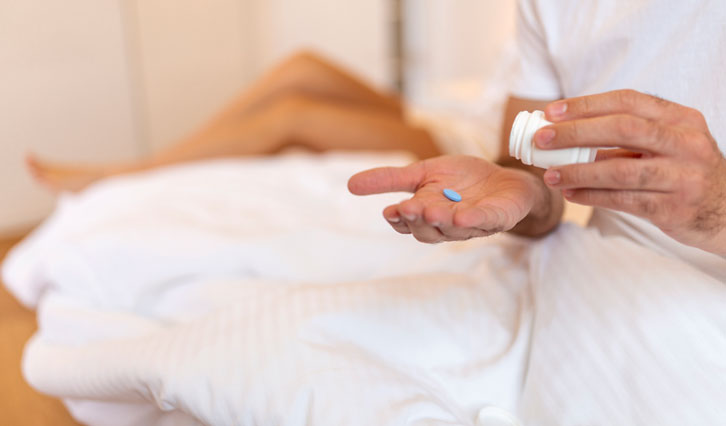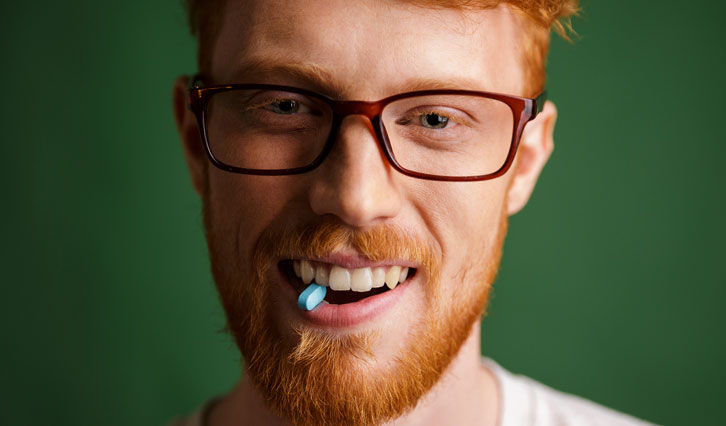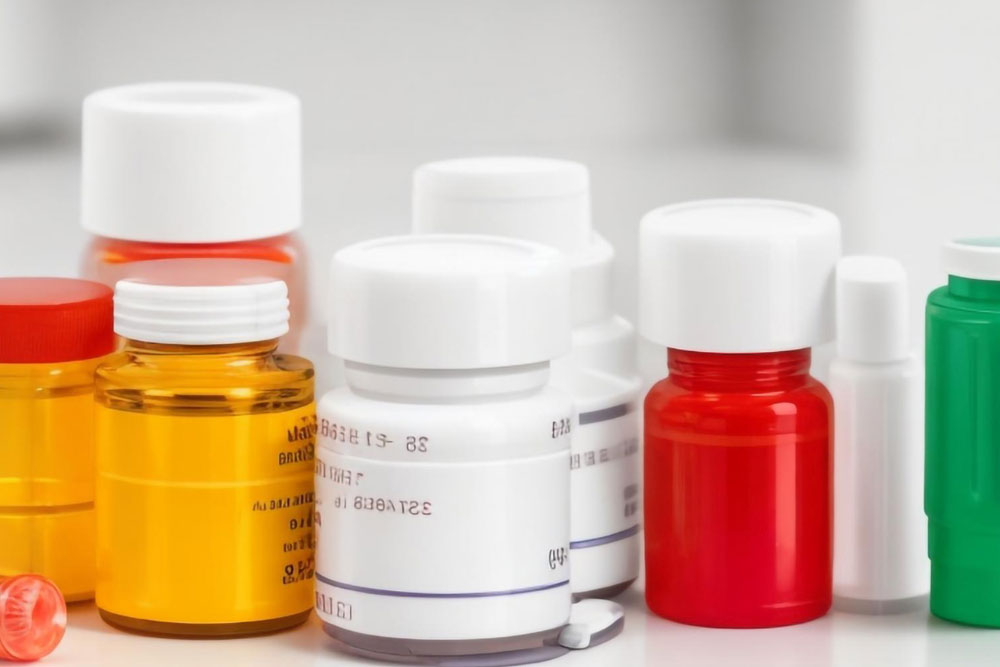Understanding Sildenafil and its role in treating Erectile Dysfunction

Sildenafil, sold under the brand name Viagra among others, is a medication primarily used to treat erectile dysfunction (ED) and pulmonary arterial hypertension (PAH). It was originally developed by Pfizer and was the first oral treatment approved for ED.
It's important to note the following points regarding Sildenafil:
Prescription: Sildenafil is a prescription medication, which means it should only be taken under the guidance of a healthcare professional. They will determine the appropriate dosage and usage based on your individual health condition and needs.
Side Effects: Common side effects of Sildenafil include headache, flushing, indigestion, nasal congestion, and visual disturbances (such as blue-tinged vision). Rare but serious side effects can include prolonged erections (priapism) or sudden vision or hearing loss. If you experience any concerning side effects, you should seek medical attention.
Interactions: Sildenafil can interact with certain medications, particularly those containing nitrates (often used for chest pain), and cause a dangerous drop in blood pressure. It's crucial to inform your healthcare provider about all medications you're taking to avoid potential interactions.
Contraindications: Drug should not be taken by individuals who have certain medical conditions, such as severe heart problems, uncontrolled high blood pressure, or recent strokes. It's important to discuss your medical history with your doctor before starting Sildenafil.
Dosage: The dosage of Sildenafil can vary based on the condition being treated and individual response. It's typically taken as needed for ED, about 30 minutes to 4 hours before sexual activity. For PAH, it might be taken three times a day. Your doctor will determine the most suitable dosing regimen for you.
Recreational Use: Medicine is sometimes used recreationally by individuals without ED, as it's thought to enhance sexual performance. However, this can be risky, as the medication is intended for specific medical purposes and may not be safe or appropriate for everyone.
Erectile Dysfunction (ED)
ED is a condition characterized by the inability to achieve or maintain an erection sufficient for sexual activity. Sildenafil works by inhibiting an enzyme called phosphodiesterase type 5 (PDE5), which leads to increased blood flow to the penis, facilitating the achievement and maintenance of an erection when sexually aroused.
Pulmonary Arterial Hypertension (PAH)
PAH is a condition where the blood pressure in the arteries of the lungs is elevated, putting strain on the heart and lungs. Sildenafil can help lower the blood pressure in these arteries by relaxing and dilating them, which eases the workload on the heart.
How to take Sildenafil

Here are some general guidelines on how to take Sildenafil:
Timing: If you are taking Sildenafil for erectile dysfunction, it's usually taken about 30 minutes to 4 hours before sexual activity. The medication's effects can last for around 4 to 6 hours. For pulmonary arterial hypertension, your doctor will provide specific instructions on how often to take the medication.
Fasting State: Sildenafil can be taken with or without food. However, taking it on an empty stomach might lead to faster absorption and onset of effects. If you take it with a high-fat meal, it might take longer for the medication to start working.
Avoid Alcohol: Drinking alcohol in excess while taking Sildenafil can increase the risk of side effects such as dizziness, headache, and low blood pressure. It's advisable to limit alcohol consumption when using Sildenafil.
Tablet Swallowing: Swallow the tablet whole with a glass of water. Do not crush, chew, or break the tablet, as this can affect how the medication is absorbed by your body.
Interaction with Other Medications: Inform your healthcare provider about all the medications you are currently taking, including prescription, over-the-counter, and herbal supplements. Sildenafil can interact with certain medications, particularly those containing nitrates, and cause a dangerous drop in blood pressure.
Recreational Use: Remedy should only be taken for its intended medical purposes. Using it recreationally without a medical need can be risky and may lead to unnecessary side effects.
Side Effects

Sildenafil, like any medication, can have potential side effects. It's important to note that not everyone will experience these side effects, and some individuals might experience different levels of severity. If you have concerns about any side effects, it's recommended to discuss them with your healthcare provider. Here are some potential side effects associated with Sildenafil:
Common Side Effects:
- Headache
- Flushing (redness and warmth in the face and neck)
- Indigestion or upset stomach
- Nasal congestion
- Changes in vision, such as blurred vision, sensitivity to light, or changes in color perception
- Back pain or muscle aches
Less Common Side Effects:
- Dizziness or lightheadedness
- Nausea
- Diarrhea
- Rash or skin irritation
- Heartburn
Serious Side Effects (Rare, but Require Immediate Medical Attention):
- Priapism: An erection lasting longer than 4 hours. This can be painful and requires prompt medical attention to avoid permanent damage to the penis
- Sudden loss of vision or changes in vision (non-arteritic anterior ischemic optic neuropathy)
- Sudden decrease or loss of hearing
- Chest pain or discomfort, which might indicate a serious cardiovascular issue
- Irregular heartbeat or palpitations
- Severe allergic reactions (rash, itching, swelling, severe dizziness, difficulty breathing)
Keep in mind that the benefits of using Sildenafil should be weighed against the potential risks and side effects.
How does Sildenafil work?

Sildenafil works by inhibiting an enzyme called phosphodiesterase type 5 (PDE5). This enzyme is primarily found in the smooth muscle cells of the blood vessels in the penis and lungs. By inhibiting PDE5, drug has the following effects:
For Erectile Dysfunction (ED):
When a man becomes sexually aroused, the body releases a chemical called nitric oxide (NO) in the erectile tissue of the penis. Nitric oxide stimulates the production of a molecule called cyclic guanosine monophosphate (cGMP), which relaxes the smooth muscles and allows the blood vessels in the penis to dilate. This increased blood flow into the penis leads to an erection.
However, PDE5 breaks down cGMP, leading to the relaxation of the penile muscles and a decrease in blood flow, which can result in loss of erection. Sildenafil inhibits PDE5, preventing it from breaking down cGMP. As a result, cGMP levels remain elevated, leading to prolonged relaxation of the penile muscles, increased blood flow, and improved ability to achieve and maintain an erection.
For Pulmonary Arterial Hypertension (PAH):
In the case of PAH, the blood vessels in the lungs become narrowed and constricted, increasing the pressure within them. This puts strain on the heart and reduces the efficiency of oxygen exchange in the lungs.
Sildenafil works by relaxing the smooth muscles in the walls of the pulmonary arteries (the arteries in the lungs). By inhibiting PDE5, it allows cGMP to accumulate in these smooth muscle cells. This causes the blood vessels to dilate and the blood pressure in the lungs to decrease. The reduced strain on the heart and improved blood flow in the lungs can help alleviate the symptoms of PAH.
In both cases, the underlying mechanism is the same: by inhibiting PDE5, Sildenafil promotes the relaxation and dilation of blood vessels, leading to improved blood flow. However, it's important to note that effects are only observed in the presence of sexual arousal or stimulation. It does not cause spontaneous erections or increase sexual desire on its own.
Can I drink alcohol while taking Sildenafil?

It's generally advised to limit alcohol consumption while taking Sildenafil. While small amounts of alcohol may not cause significant interactions, excessive alcohol intake can potentially worsen certain side effects and reduce the effectiveness of Sildenafil. Here are some reasons to consider when combining alcohol and this medicine:
Blood Pressure Interaction: Both alcohol and Sildenafil can independently cause a decrease in blood pressure. When taken together, they can have a cumulative effect, leading to a more pronounced drop in blood pressure. This can result in dizziness, lightheadedness, and even fainting.
Enhanced Side Effects: Alcohol can enhance some of the common side effects of Sildenafil, such as headache, dizziness, and flushing. This can make these side effects more uncomfortable or severe.
Diminished Effectiveness: Excessive alcohol consumption can impair the ability to achieve and maintain an erection, potentially counteracting the effects of Sildenafil. If the goal of taking tablets is to address erectile dysfunction, it's best to avoid alcohol or consume it in moderation.
Safety Concerns: Combining Sildenafil with large amounts of alcohol can impair judgment and coordination. This can be risky, especially if engaging in activities that require alertness, such as driving.
If you're considering consuming alcohol while taking Sildenafil, it's advisable to follow these guidelines:
- Moderation: If you choose to drink alcohol, do so in moderation. Limit your alcohol intake to a safe and reasonable amount.
- Consult Your Doctor: Before combining alcohol with Sildenafil, it's recommended to consult your healthcare provider. They can provide personalized advice based on your medical history and current health status.
- Be Observant: Pay attention to how your body reacts when taking Sildenafil and drinking alcohol. If you notice any adverse effects or an increased intensity of side effects, it's wise to reconsider or limit alcohol consumption.
- Plan Ahead: If you know you'll be taking medicine and want to have a drink, plan accordingly. You might choose to avoid alcohol around the time you're taking the medication or limit your alcohol intake.
Remember that your safety and health are the top priorities.
What drugs should not be taken with Sildenafil?

Sildenafil can interact with certain drugs, potentially leading to adverse effects or reducing the effectiveness of the medication. It's crucial to inform your healthcare provider about all the medications you're taking, including prescription, over-the-counter, and herbal supplements, before starting Viagra. Here are some categories of drugs that can interact with Sildenafil:
Nitrates: Medicine should never be taken with nitrates or medications containing nitrates. Nitrates are often used to treat angina (chest pain) and include nitroglycerin, isosorbide dinitrate, and isosorbide mononitrate. Combining Sildenafil with nitrates can lead to a dangerous drop in blood pressure, which can be life-threatening.
Alpha-Blockers: Drugs known as alpha-blockers, used to treat conditions like high blood pressure and benign prostatic hyperplasia (BPH), can interact with Sildenafil and lead to low blood pressure. Combining the two can result in dizziness, lightheadedness, and fainting.
Other PDE5 Inhibitors: Sildenafil is a phosphodiesterase type 5 (PDE5) inhibitor, and using it in combination with other medications in the same class (such as tadalafil, vardenafil) can increase the risk of side effects and complications.
HIV Protease Inhibitors: Some medications used to treat HIV/AIDS, known as protease inhibitors, can increase the levels of Sildenafil in the body, potentially leading to an increased risk of side effects.
Certain Antibiotics and Antifungals: Some antibiotics (like erythromycin) and antifungal medications (like ketoconazole) can inhibit the breakdown of Sildenafil in the body, leading to increased levels of the medication and a higher risk of side effects.
Grapefruit and Grapefruit Juice: Grapefruit and grapefruit juice can interfere with the breakdown of Sildenafil in the body, leading to increased levels of the medication and a higher risk of side effects.
Certain Blood Pressure Medications: Some blood pressure medications, like alpha-blockers and certain calcium channel blockers, can interact with Sildenafil and lead to a drop in blood pressure.
Medications for Pulmonary Hypertension: If you're taking other medications for pulmonary arterial hypertension (PAH), combining them with Sildenafil should be done under the guidance of a healthcare provider, as the interactions can be complex.
Recreational Drugs: Some recreational drugs, like poppers (alkyl nitrites), can also interact with Sildenafil and cause a dangerous drop in blood pressure.
It's important to emphasize that the above list is not exhaustive.
Can I buy Sildenafil online?

You can purchase Sildenafil online, but there are several important factors to consider before doing so:
Prescription Requirement: In many countries, Sildenafil is a prescription-only medication. This means that a licensed healthcare provider needs to assess your medical history and condition before prescribing it to you. Buying prescription medications without a valid prescription can be unsafe and may lead to health risks.
Legitimacy of Online Pharmacies: If you decide to purchase Viagra online, it's crucial to ensure that you are using a reputable and licensed online pharmacy. There are many illegitimate websites that sell counterfeit or substandard medications, which can be ineffective or harmful to your health.
Health Risks: Without a proper medical evaluation, you might not be aware of potential interactions with other medications you're taking or underlying health conditions that could be exacerbated by Sildenafil. Self-diagnosing and self-medicating can lead to serious health risks.
Dosage and Instructions: A healthcare provider will determine the appropriate dosage and usage instructions based on your individual health profile. Buying medication online without proper guidance might lead to incorrect dosing or usage.
Privacy and Security: When purchasing medications online, ensure that the website has secure payment options and safeguards your personal and financial information.
Regulations Vary: Regulations surrounding the online sale of medications vary by country. It's important to be aware of the regulations in your specific location.
If you're interested in obtaining Sildenafil online, I strongly recommend that you follow these guidelines:
Consult a Healthcare Provider: Prior to purchasing Sildenafil online, consult a licensed healthcare provider. They can assess your medical history, determine if Sildenafil is appropriate for you, and provide a prescription if necessary.
Choose a Reputable Pharmacy: If you decide to purchase from an online pharmacy, ensure that it's licensed, reputable, and requires a prescription for prescription medications.
Provide Accurate Information: If you are purchasing from a legitimate online pharmacy, you will likely need to provide accurate medical information and answer questions about your health. This is essential for your safety.
Beware of Counterfeits: Be cautious of extremely low prices or websites that do not require a prescription. Counterfeit medications are a serious concern and can pose significant health risks.
Can I get Sildenafil without a prescription?

The availability of Viagra without a prescription varies by country and local regulations. In most countries, Sildenafil is a prescription-only medication. This means that you would typically need a prescription from a licensed healthcare provider in order to legally obtain and use Sildenafil.
Obtaining prescription medications without a valid prescription can be risky and potentially dangerous to your health. A healthcare provider's assessment is crucial to determine if Sildenafil is appropriate for you based on your medical history, current health status, and any potential interactions with other medications you may be taking.
If you come across websites or sources that claim to offer Sildenafil without a prescription, it's important to exercise caution. Purchasing medications from unregulated sources or without proper medical oversight can lead to health risks and the potential for receiving counterfeit or substandard medications.
To ensure your safety and the effectiveness of your treatment, it's strongly recommended to consult a licensed healthcare provider before starting any medication, including Sildenafil. They can provide personalized guidance, assess your health, and determine if Sildenafil is a suitable option for your needs.
Sildenafil Alternatives

There are several alternatives to Sildenafil (Viagra) for treating erectile dysfunction (ED) or other related conditions. It's important to consult with a healthcare provider before trying any alternative treatments to determine the most appropriate option based on your specific health needs and medical history. Here are some common alternatives:
Tadalafil (Cialis): Tadalafil is another type of phosphodiesterase type 5 (PDE5) inhibitor like Viagra. It works similarly to Sildenafil but has a longer duration of action, allowing it to remain effective for up to 36 hours. This longer window of effectiveness often gives more flexibility in timing sexual activity.
Vardenafil (Levitra): Vardenafil is another PDE5 inhibitor that is used to treat ED. It works similarly to Sildenafil and tadalafil and can be an option for those who may not respond well to one of the other medications.
Avanafil (Stendra): Avanafil is a relatively newer PDE5 inhibitor that also works to increase blood flow to the penis. It has a faster onset of action compared to other PDE5 inhibitors, often within 15-30 minutes.
Vacuum Erection Devices (VEDs): A vacuum erection device is a non-drug option for treating ED. It's a mechanical device that creates a vacuum around the penis, drawing blood into the area and causing an erection. A constriction ring is then placed at the base of the penis to maintain the erection.
Penile Injections: Some individuals use injections of medications like alprostadil directly into the penis to create an erection. This method is typically used when oral medications are not effective or are contraindicated.
Penile Implants: For individuals who do not respond to other treatments, penile implants (inflatable or malleable) can be surgically implanted to create an erection. This is a more invasive option and is usually considered when other treatments are not effective.
Lifestyle Changes: In some cases, making lifestyle changes such as maintaining a healthy weight, exercising regularly, managing stress, and addressing any underlying health conditions (like diabetes or high blood pressure) can help improve erectile function.
Psychological Counseling: If ED is related to psychological factors such as stress, anxiety, or relationship issues, counseling or therapy can be beneficial in addressing these underlying causes.
It's important to remember that the effectiveness of these alternatives can vary from person to person. Consulting a healthcare provider is essential to determine the best treatment approach for your individual situation. Additionally, be cautious of unproven or "miracle" treatments advertised online, as they may not be safe or effective. Always prioritize your health and safety by seeking guidance from qualified medical professionals.
